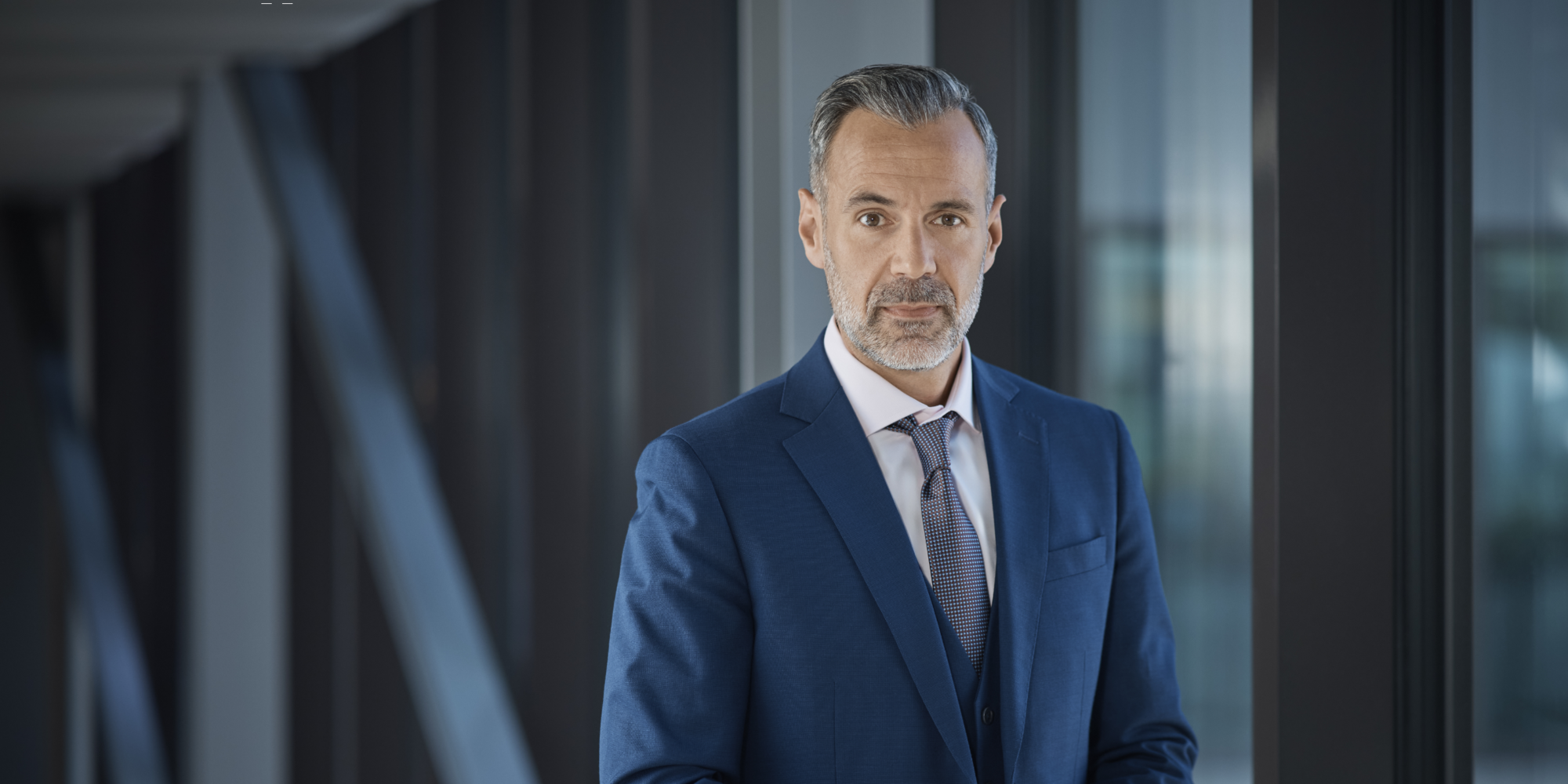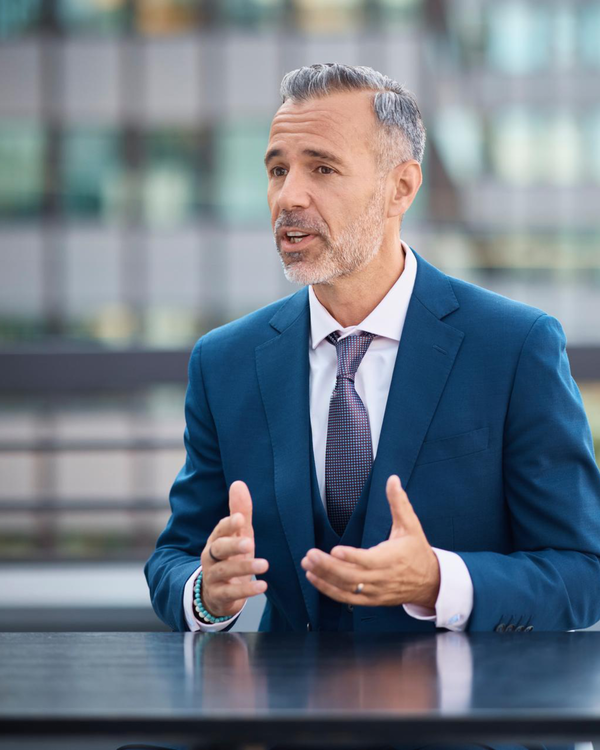Investing in thematic funds: "An impressive comeback"
In turbulent market conditions, active investments can score, observes René Nicolodi. The Head of Equities in Asset Management explains where specific opportunities for thematic investments lie – and why growth isn’t everything.
Interview with Dr René Nicolodi

Three key points on the comeback of sustainable investment themes:
- In turbulent market conditions, active investments can score.
- In the real economy, the challenges and opportunities of the energy transition, the precious resource of water, and health are gaining importance.
- Especially in uncertain market phases, focusing on quality in the portfolio pays off.
René, as Head of Equities in Asset Management at Zürcher Kantonalbank, you closely follow economic and global developments. Looking back over the past year: Did you anticipate such massive upheavals – particularly in U.S. politics?
René Nicolodi: It’s often said about U.S. President Donald Trump that one shouldn’t take his statements literally but should take them seriously. Indeed, the political agenda of his administration was known in advance – and yet the number and speed of decrees, not just around U.S. tariff policy, caught many investors off guard. That unpredictable element will likely continue to occupy us in the future.
It’s clear that Trump has little interest in "sustainability." Last fall, three new sustainable thematic funds managed by your team were launched, addressing long-term structural challenges. Are these products outdated a year later?
Quite the opposite: in the real economy, the challenges and opportunities of the energy transition, the precious resource of water, and health are gaining importance. At the turn of the year, sustainable and traditional equity investments suffered setbacks almost across the board. But since then, specific themes have staged an impressive comeback. Currently, we observe this particularly in companies whose activities align with investment themes like climate protection and decarbonization, the transition to a circular economy, and resource efficiency through AI.
Has the recovery in performance already translated into new asset inflows into thematic funds?
Currently, a lot of capital is flowing into thematic investments. According to calculations by the major bank Barclays, assets under management in thematic funds increased by 15% in the second quarter of 2025 compared to the previous quarter. Globally, nearly USD 660 billion is now invested in thematic investments. Although geopolitical and macroeconomic issues dominate the agenda, we are seeing increased interest from investors in our Swisscanto offering.
Given Trump’s slogan "Drill baby drill" and the promised subsidies for the oil and gas industry, this comeback might seem surprising.
That’s one way to look at it. However, the short-term debate about fossil fuel extraction contrasts with the long-term transformation of the economy based on renewable energies, as well as rising energy demand – not least for data centers for artificial intelligence (AI). Interestingly, new onshore wind and photovoltaic plants are often the most cost-effective option for electricity generation, as calculated by the International Energy Agency (IEA) in 2024. This is because the levelized cost of electricity (see graphic below) for some renewables is significantly lower than for coal and gas power plants. For example, the LCOE for photovoltaics is around USD 55 per megawatt-hour, compared to USD 105 for coal and USD 60 for gas power plants.
More affordable renewables: Costs of building new power plants (example USA)

So, it’s the subsidies for oil and gas that are more at odds with the trend?
In our view, the energy transition is in full swing. In 2024 alone, nearly twice as much was invested globally in clean energy as in fossil fuels, according to IEA estimates. This trend in the real economy remains unbroken in our view and generates corresponding demand. Therefore, solutions to long-term risks like climate change or resource scarcity can offer very attractive growth opportunities over decades.
This is the concept of thematic funds that focus on megatrends – but whether this is realized only becomes clear after several years. How does your team approach this?
Our thematic funds are based on an investment philosophy we’ve adhered to for over 20 years: Through systematic screening, we identify areas of the economy where we see significant long-term challenges in the environmental and social domains. In our view, such companies are ideally positioned to grow faster than global GDP. This gives them the potential for long-term outperformance. We’ve defined no fewer than five sustainable megatrends as potential alpha sources – which we call investment themes.
What are these?
First, the investment theme "Climate," focusing on climate protection and decarbonization. Second, "Water," addressing water scarcity. Then comes the "Digital Economy," with the opportunities of digitalization, followed by the transition to a circular economy, and finally, "Healthy Longevity," focusing on healthy aging. Each investment theme is pursued with a dedicated sustainable equity portfolio.
However, themes like decarbonization or digitalization are vast fields. Where does your team see specific investment opportunities?
Take the energy transition: to benefit as an investor from this transformation, electrification is one option. This is against the backdrop that electricity demand could double or even triple by 2050, according to the IEA. Without a massive expansion of grids and electricity infrastructure, this energy hunger is unlikely to be satisfied. Companies positioned with their products and services can already benefit from this demand. Additionally, a future-proof electricity infrastructure can contribute to decarbonization, greater energy independence, and securing prosperity.

In the medium term, AI’s net effect on emissions could be positive.
René Nicolodi, Head Equities & Themes
Expanding electricity infrastructure is also a prerequisite for the long-term trend toward digitalization. Where are attractive investment opportunities here?
We deliberately don’t invest in all areas of the digital economy. We focus on areas like cloud technology and data centers, networks, energy efficiency, and various forward-looking applications related to AI. Given the high valuations and market concentration of large U.S. tech firms, the so-called Magnificent 7, we see value in looking beyond the digital horizon.
But AI data centers are power-hungry and water thirsty. How does that align with sustainability?
According to IEA forecasts, energy consumption by data centers could triple by 2035 due to AI growth. However, half of the electricity demand is expected to be met by low-carbon energy sources. AI applications could also play a crucial role in reducing overall greenhouse gas emissions – for example, by optimizing electricity usage through AI. In the medium term, AI’s net effect on CO2 emissions could even be positive. Incidentally, we also see interesting applications for AI in the water investment theme.
Which ones?
AI offers great potential for more efficient use of water resources, particularly in water supply and agriculture. AI-driven forecasts can also help address the risk of water scarcity in the long term. In practice, for example, by integrating generative AI into the planning and design of water infrastructure projects. Thanks to such new tools, the world could become more resilient to droughts and environmental disasters in the long term.
That leaves the two investment themes of the circular economy and healthy longevity. Which areas are attractive from an investment perspective here?
We currently find the area of prevention particularly exciting. By 2050, up to 2 billion people could be over 60 years old, according to UN projections. And with increasing life expectancy, the need for treating age-related ailments rises. Innovations are needed to limit the growth of healthcare costs. Innovative diagnostics or preventive treatments that help prevent severe illnesses are coming to the forefront. According to the consulting firm Frost & Sullivan, the share of prevention in healthcare spending could rise from 9% in 2012 to 22% this year (see graphic below).
Healthcare spending shifts toward prevention

Like aging, resource depletion is a long-term risk for humanity. Already, we consume significantly more natural resources than can regenerate within ecosystems. Can the circular economy, as a relatively young trend, still reverse this development?
None other than U.S. President Trump said that American girls could be happy with two dolls instead of 30. This statement was aimed at potential consequences of his tariff policy: In fact, the Trump administration’s focus on domestic production and strategic resources could give the circular economy a boost. We believe that material reduction, recycling, reuse, and substitution can unlock growth that is still underestimated in financial markets.
We’ve talked a lot about growth opportunities. But thematic investments sometimes suffer from jumping on new trends while profitability falls by the wayside. How does your team address this issue?
Growth potential and alignment with a long-term investment theme are, in our view, not sufficient reasons to buy a company’s shares. Equally important is quality: We consider companies attractive if their growth is profitable and they stand out for high capital returns, low debt, and a management team with an excellent track record. Especially in uncertain market phases and during declining interest rates, focusing on quality in the portfolio pays off.
Sustainability, growth, and quality: Is this the formula you and your team aim to use to continue leading thematic funds to success in the future?
This aligns with our approach to investing in long-term investment themes. Active management should not be forgotten: It provides our strategies with the flexibility to respond in a timely manner to changes within investment themes. With this, we hope to generate returns for our investors not only in the coming year but also in the next decade.
Legal Disclaimer Switzerland
Legal Disclaimer Switzerland
This document only serves advertising and information purposes, is for distribution in Switzerland only and is not directed at persons in whose nationality or place of residence prohibit access to such information under applicable law. Where not indicated otherwise, the information concerns the collective investment schemes under the law of Luxembourg managed by Swisscanto Asset Management International S.A. (hereinafter "Swisscanto Funds"). The products described are undertakings for collective investment in transferable securities (UCITS) within the meaning of EU Directive 2009/65/EC, which is governed by Luxembourg law and subject to the supervision of the Luxembourg supervisory authority (CSSF). This document does not constitute a solicitation or invitation to subscribe or make an offer to purchase any securities, nor does it form the basis of any contract or obligation of any kind. The sole binding basis for the acquisition of Swisscanto Funds are the respective legal documents (management regulations, sales prospectuses and key information documents (PRIIP KID), as well as financial reports), which can be obtained free of charge at https://products.swisscanto.com as well as at Swisscanto Fondsleitung AG, Bahnhofstrasse 9, CH-8001 Zurich (also acting as representative of the Luxembourg Swisscanto funds in Switzerland) or in all offices of Zürcher Kantonalbank. Paying Agent for the Luxembourg Swisscanto funds in Switzerland is Zürcher Kantonalbank, Bahnhofstrasse 9, CH-8001 Zurich. Information about the sustainability-relevant aspects in accordance with the Regulation (EU) 2019/2088 as well as Swisscanto's strategy for the promotion of sustainability and the pursuit of sustainability goals in the fund investment process are available on the same website. The sub-fund referred to in the document is subject to Article 9 of Regulation (EU) 2019/2088. The distribution of the fund may be suspended at any time. Investors will be informed about the deregistration in due time. The investment involves risks, in particular those of fluctuations in value and earnings. Investments in foreign currencies are subject to exchange rate fluctuations. Past performance is neither an indicator nor a guarantee of future success. The risks are described in the sales prospectus and in the PRIIP KID. The information contained in this document has been compiled with the greatest care. Despite professional procedures, the correctness, completeness and topicality of the information cannot be guaranteed. Any liability for investments based on this document will be rejected. The document does not release the recipient from his or her own judgment. In particular, the recipient is recommended to check the information for compatibility with his or her personal circumstances as well as for legal, tax and other consequences, if necessary, with the help of an advisor. The prospectus and PRIIP KID should be read before making any final investment decision. The products and services described in this document are not available to U.S. persons under the relevant regulations (in particular Regulation S under the U.S. Securities Act of 1933).
Data as at (where not stated otherwise): 11.2024
© Zürcher Kantonalbank. All rights reserved.
Legal Disclaimer international
Legal Disclaimer international
This document only serves advertising and information purposes and is not directed at persons in whose nationality or place of residence prohibit access to such information under applicable law. Where not indicated otherwise, the information concerns the collective investment schemes under the law of Luxembourg managed by Swisscanto Asset Management International S.A. (hereinafter "Swisscanto Funds"). The products described are undertakings for collective investment in transferable securities (UCITS) within the meaning of EU Directive 2009/65/EC, which is governed by Luxembourg law and subject to the supervision of the Luxembourg supervisory authority (CSSF).
This document does not constitute a solicitation or invitation to subscribe or make an offer to purchase any securities, nor does it form the basis of any contract or obligation of any kind. The sole binding basis for the acquisition of Swisscanto Funds are the respective published legal documents (management regulations, sales prospectuses and key information documents (PRIIP KID), as well as financial reports), which can be obtained free of charge at https://products.swisscanto.com/. Information about the sustainability-relevant aspects in accordance with the Regulation (EU) 2019/2088 as well as Swisscanto's strategy for the promotion of sustainability and the pursuit of sustainability goals in the fund investment process are available on the same website. The sub-fund referred to in the document is subject to Article 9 of Regulation (EU) 2019/2088.
The distribution of the fund may be suspended at any time. Investors will be informed about the deregistration in due time. The investment involves risks, in particular those of fluctuations in value and earnings. Investments in foreign currencies are subject to exchange rate fluctuations. Past performance is neither an indicator nor a guarantee of future success. The risks are described in the sales prospectus and in the PRIIP KID. The information contained in this document has been compiled with the greatest care. Despite professional procedures, the correctness, completeness and topicality of the information cannot be guaranteed. Any liability for investments based on this document will be rejected. The document does not release the recipient from his or her own judgment. In particular, the recipient is recommended to check the information for compatibility with his or her personal circumstances as well as for legal, tax and other consequences, if necessary, with the help of an advisor. The prospectus and PRIIP KID should be read before making any final investment decision.
An overview of investors' rights is available at https://www.swisscanto.com/int/en/legal/summary-of-investor-rights.html.
The products and services described in this document are not available to U.S. persons under the relevant regulations (in particular Regulation S under the U.S. Securities Act of 1933). Data as at (where not stated otherwise): 11.2024
© Zürcher Kantonalbank. All rights reserved.

